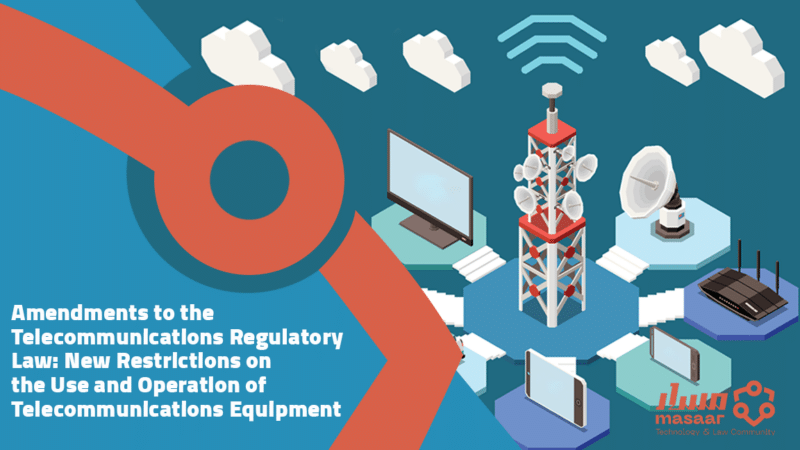
● Introduction
● An incomplete attempt to amend the Communications Act
● The content of the recent amendments to the Telecommunications Regulatory Law
● The powers of the National Telecommunications Regulatory Authority to grant permits for the import, use, and operation of equipment
● Justifications and motives for the expansion of forms of criminalization of the use and operation of communications equipment
● A comment on the justifications of the Ministry of Communications and the Egyptian Parliament for issuing the law
Introduction
During the last ten years, there has been much talk of amendments to the Egyptian Telecommunications Regulatory Law No. 10 of 2003, which is the basic law regulating everything related to the telecommunications sector. The most serious attempt to amend the law was in 2014, when a number of news websites reported on the preparation of a draft law proposed by the National Telecommunications Regulatory Authority (NTRA), the law enforcement agency. Although the draft law received the initial approval of the President, it was not passed, without giving reasons for that.
In the last quarter of 2022, the Egyptian Parliament debated a new proposal to amend the Telecommunications Law, but this time it was submitted by the government. The latest proposal ignored all previously proposed amendments by NTRA and was limited to amending the text of two articles of the law. Discussion of the last proposal did not last long, as the amendments were approved and entered into force at the end of 2022.
This paper deals with the 2014 proposal to amend the Egyptian Telecommunications Regulatory Law and then moves on to the content of the amendments that have already been approved and entered into force in 2022. These amendments include harsher penalties related to the import or manufacture of telecommunications equipment and the introduction of penalties for new criminalized forms. The paper also deals with the powers of NTRA to grant permits to import, use and operate equipment, in addition to the justifications of the Ministry of Communications and the Egyptian Parliament for approving the amendment of the law and finally, comments on those justifications.
An incomplete attempt to amend the Telecommunications Law
In the middle of 2014, a number of news websites reported the preparation of a draft law proposed by NTRA.1 The proposed amendments included the deletion and addition of more than twenty articles out of eighty-seven articles. The proposed amendments aimed, in their entirety, at amending the rules related to the role of NTRA in protecting free competition and protecting the rights of users in the field of telecommunications. This is in order to resolve the conflict between the role of NTRA and the Competition Protection Agency and to prevent monopolistic practices within the scope of the telecommunications sector.
The proposed amendments also included the impermissibility of cutting communications or stopping their operations in whole or in part except by a decision issued by the President based on a proposal from the Cabinet. In addition, it is not permissible to cut off or disable the relief and emergency communication services in any way. The amendments also extended to the possibility of NTRA drawing up a list that includes financial and administrative penalties to be imposed by the agency, as well as the prescribed compensations. The draft amendment to the law also included new provisions on interconnection between companies, allowing NTRA to amend interconnection agreements in force between companies. The draft referred to an amendment that obliges telecom service providers and operators and their agents and distributors not to market telecom services except after obtaining accurate information and data about users.
For unknown reasons, this proposal was not passed, despite the initial approval of the President on the amendments proposed by NTRA, according to the news circulating in this regard.
Almost nine years after that proposal, the Egyptian Parliament discussed a new proposal to amend the Telecommunications Regulatory Law. The proposal included amendments to the text of Articles 44 and 77, which are articles related to the inadmissibility of possessing, using, operating, installing, or marketing telecommunications equipment without obtaining a license from NTRA. The amendments were approved and entered into force at the end of 2022 without any mention or discussion of the NTRA proposal that was prepared in 2014.
Amendments to the Telecommunications Regulatory Law
First: Amending Article 44 by adding new forms of criminalization
Amendments to the Telecommunications Law came in the form of an amendment in addition to existing texts. The amendments did not include completely new texts but were limited to adding some forms of criminalization to the crimes stipulated in Article 44, and introducing penalties for these new forms, in addition to harshening some of the penalties previously existing in Article 77.
The first paragraph of Article 44 stipulates that it is prohibited to “import”, “manufacture” or “assemble” any telecommunications equipment without obtaining a permit to do so from NTRA. The amendment modified the text of the article to prohibit 5 new acts in addition to the previous ones, which are the acts of “possession”, “use”, “operation”, “installation” or “marketing” of any telecommunications equipment without obtaining a permit to do so from NTRA. Thus, the legislator extended the scope of the ban on unauthorized communications equipment to broader categories such as installation and maintenance technicians, individuals and entities marketing the equipment, and finally consumers of these devices, after the ban was limited to manufacturers and importers as they are the first hand in the process of producing or importing devices from abroad.
As a result of this amendment, the mere use or operation of any equipment not authorized by NTRA constitutes a criminal offense. That equipment could be routers or networking equipment, for example. While this prohibition, in any of its forms, is not supposed to extend to any of the peripheral communication devices such as mobile phones, smartwatches, and other user devices.
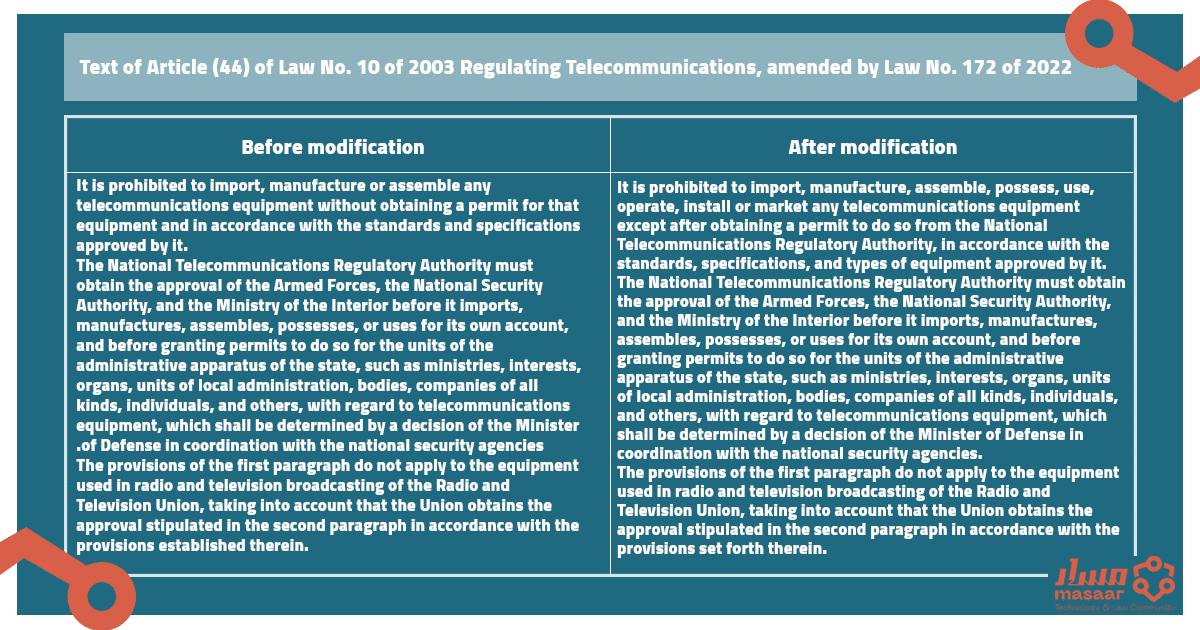
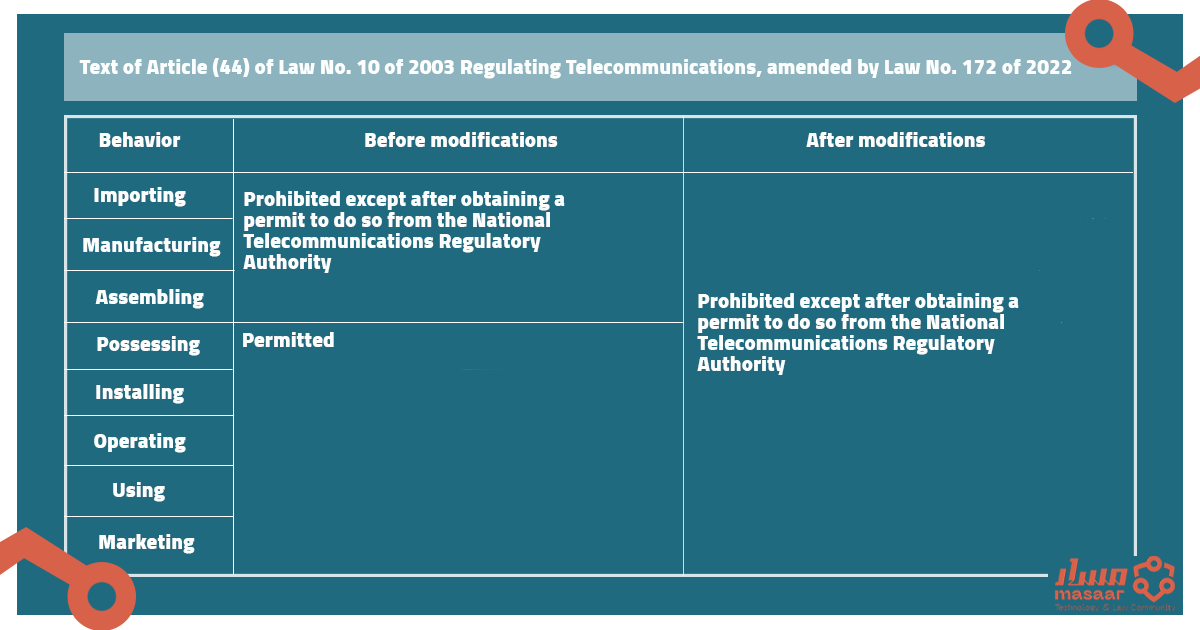
Second: Amending Article 77 by increasing some penalties and introducing penalties for new forms of criminalization
The other article that was amended in the Telecommunications Law is Article 77. This article relates to the penalties that can be imposed in case of violation of Article 44 of the law, in addition to the aggravating circumstances of each crime. The amendment to that article came to increase the penalties related to importing or manufacturing telecommunications equipment and introduce penalties for newly criminalized acts. The content of this amendment can be summarized in the following points:
-
The legislator intensified the deprivation of liberty and the financial penalty prescribed for the crimes of “importing” or “manufacturing” any telecommunications equipment for the purpose of marketing it domestically, without obtaining a permit from NTRA. The penalty prescribed for committing any of them is imprisonment for a period of not less than one year and not more than five years, and a fine of not less than two million Egyptian pounds and not exceeding five million Egyptian pounds, or one of these two penalties. This is after the penalty prescribed for any of the two crimes before the entry into force of this amendment was imprisonment for a period of not less than one year and not more than three years, and a fine of not less than twenty thousand Egyptian pounds and not exceeding fifty thousand Egyptian pounds or one of these two penalties. The special intent of the crime was also deleted, which was required for the criminalization of import or manufacturing to be for the purpose of marketing inside, but if this purpose is absent and the manufacture or import is devoid of it, then the act is permissible and there is no crime for doing it. After the deletion of private intent under this amendment, import or manufacture became criminalized in general, regardless of the purpose of import or manufacture, even if it was not for the purpose of promotion or marketing, and its criminalization does not depend on the existence of any special intent.
-
The legislator decided on freedom-depriving and financial penalties for the forms of crimes introduced in the amendment, which are “assembly” and “marketing” of any telecommunications equipment without obtaining a permit from NTRA. And individuals shall be punished for committing any of them with the same penalty determined for the crimes of importing and manufacturing without obtaining a permit, which is imprisonment for a period of not less than one year and not more than five years, and a fine of not less than two million Egyptian pounds and not exceeding five million Egyptian pounds, or one of these two penalties.
-
The legislator has amended the penalty prescribed for the crimes of “possession” and “installation” of any telecommunications equipment without obtaining a permit from NTRA. The amendment abolished the minimum prison sentence, and the minimum prison sentence for committing either of them became a period of no less than 24 hours, instead of a period of no less than a year. The legislator kept the maximum limit of imprisonment unchanged for a period not exceeding three years, while tightening the financial penalty to become a fine of not less than one hundred thousand Egyptian pounds and not exceeding three hundred thousand Egyptian pounds, instead of twenty thousand pounds as a minimum and fifty thousand pounds as a maximum fine while maintaining the power of the court to pass one or both penalties.
-
The legislator added some penalties to new acts that were not criminalized before, including “using” any telecommunications equipment without obtaining a permit from NTRA. Committing this act shall be punished with the same penalty prescribed for the crimes of possession and installation without obtaining a permit, which is imprisonment for a period of no less than 24 hours and no more than three years, and a fine of no less than one hundred thousand Egyptian pounds and no more than three hundred thousand Egyptian pounds, or one of these two penalties.
-
The legislator expanded the penalty prescribed for the aggravating circumstance for all the crimes stipulated in Article 44 of the Telecommunications Regulation Law. The prescribed punishment became rigorous imprisonment instead of imprisonment. In addition to the increase in criminal acts to which the aggravating circumstance applies. After the aggravating circumstance used to apply to actions such as “import”, “manufacturing” and “possession” only, it now applies to actions that were not criminalized before, such as “assembly”, “marketing”, “operating” and “using”. The scope also extended to include acts that were criminalized but did not have an aggravating circumstance, such as the crime of “installation”. The aggravating circumstance in any of these crimes is available if it is proved that any of them were committed with the aim of violating national security.
-
The legislator kept the penalty of confiscating devices and equipment, the subject of the crime, as an accessory and obligatory penalty that the court is committed to when issuing a conviction in any of these crimes, whether new crimes or crimes that were prescribed before the enforcement of this amendment.
-
The legislator kept the penalty prescribed for recidivism, i.e., committing the crime again after the previous conviction, which is the doubling of the penalty in its minimum and maximum limits in the event of repetition of any of these crimes, whether new crimes or those that were prescribed before the entry into force of this amendment.
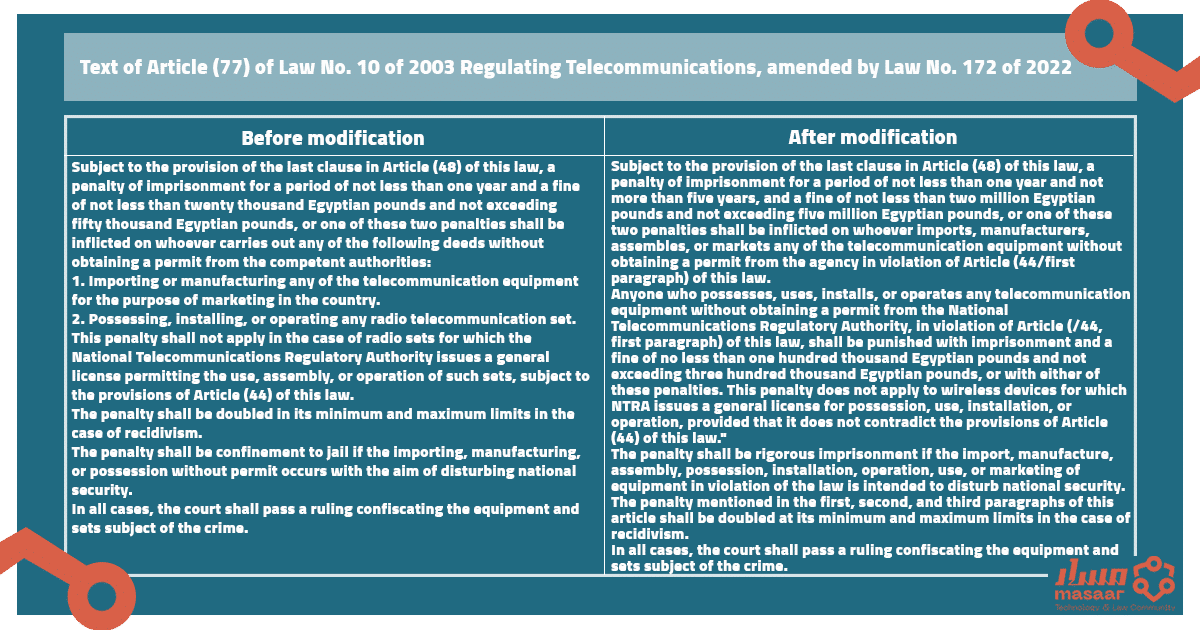
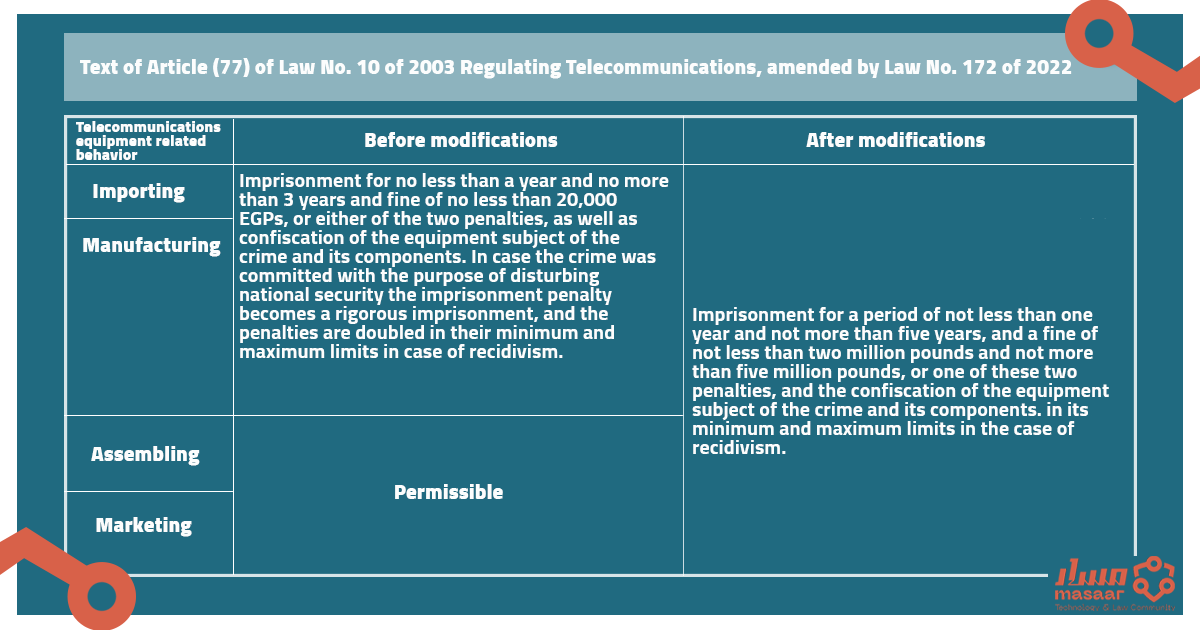
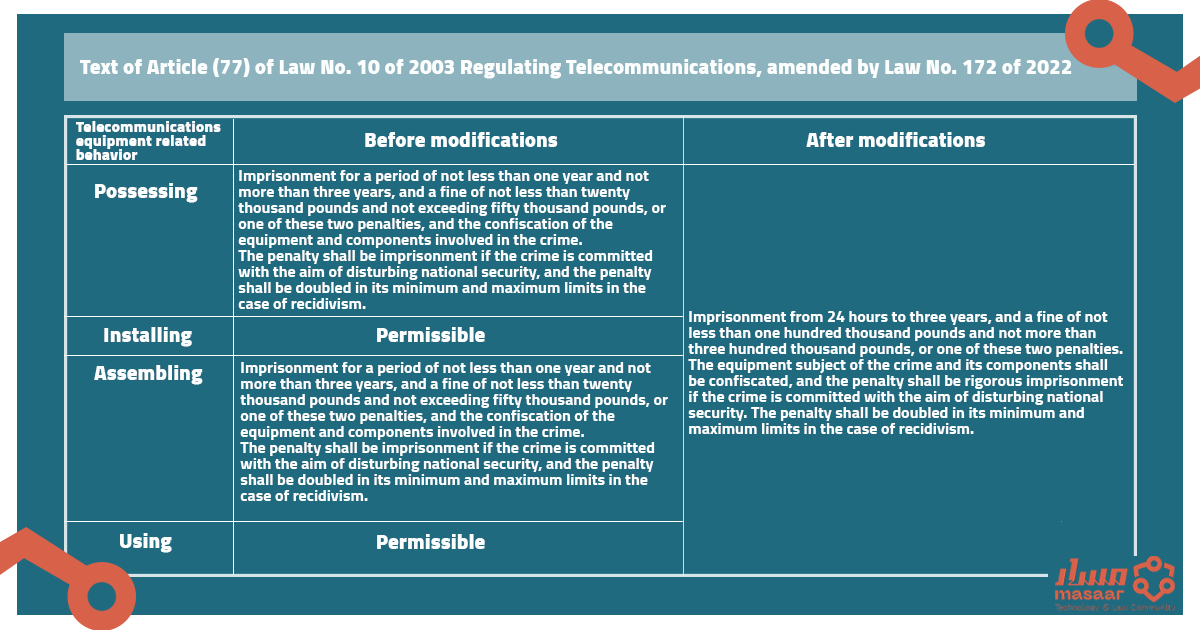
The powers of NTRA to grant permits for the import, use, and operation of equipment
The recent amendment to the Telecommunications Law relates to the powers of NTRA to grant the necessary permits to be obtained before carrying out the activities of “import”, “manufacture”, “assembly”, “possession”, “use”, “operation”, “installation” or “marketing” of any telecommunication equipment. Therefore, it is important to know the legal powers vested in the agency with regard to granting licenses and permits, the period it takes to issue permits, and how it approves the entities for which it issues permits. Article 48 of the Telecommunications Law deals with these powers, which include:
-
Determine the rules and procedures for approving any model of devices.
-
Issue permits for the import, manufacture, use, trade, and marketing of telecommunication devices and equipment.
-
Determine the necessary conditions for obtaining permits.
-
Determine the fees required to obtain permits.
The National Telecommunications Regulatory Authority, in accordance with the law, is obligated to issue or reject the permit within a period not exceeding 90 days from the date of receiving all the documents necessary to obtain the permit.2 NTRA grants the license after the process of approving the equipment to be used or imported. The accreditation is a mandatory step when importing, manufacturing or assembling devices that contain a communications component, through which it is ensured that the device conforms to the international wireless, electromagnetic, and health specifications approved in Egypt. The approval issue is handled by one of NTRA’s departments called the “Type Approval Department”. The application for accreditation is submitted on the form prepared for that, and NTRA has defined four different types of procedures for approval, namely: simplified procedures, intermediate procedures, tight procedures, and indicative procedures. NTRA periodically issues a list of devices approved by it, and the last update to the list of approved devices was on December 4, 2022.
Justifications and motives for the expansion of forms of criminalizing the use and operation of telecommunication equipment
Amendments to the Telecommunications Regulatory Law were passed quickly, with no apparent societal discussion or public clarification of the need to issue an amendment to the law. To understand the justifications and motives for passing these amendments, it is important to refer to the preparatory work for the draft amendment, especially the explanatory memorandum to amend the law issued by the Ministry of Communications and Information Technology, as well as the discussions of the Cabinet, and finally, the parliamentary reports issued by the parliamentary committees that discussed the government proposal to amend the Telecommunications Law.
First: The government’s motives referred to in the explanatory memorandum of the law
The law issued to amend the articles of the Telecommunications Regulatory Law was based on the explanatory memorandum issued by the Minister of Communications and Information Technology, which justified the need to speed up intervention to amend the law based on four reasons, namely:
-
Noting the widespread possession, use, installation, and marketing of telecommunication equipment in recent times without obtaining a license from the competent authorities, or without being approved by NTRA.
-
The practical application of the Telecommunications Regulatory Law at the present time has shown the need to criminalize these acts referred to in the first reason.
-
The practical application of the Telecommunications Regulatory Law at the present time has shown the need to review the criminal penalties imposed on violators of some of its provisions.
-
The inadequacy of some of the criminal penalties currently prescribed as a criminal penalty for committing criminal acts under the provisions of the Telecommunications Regulatory Law in a way that achieves the idea of deterrence in both its public and private forms.
On July 28, 2022, the Cabinet approved the draft law submitted by the Minister of Communications and Information Technology.3 The council justified its approval by saying that the aim of this amendment is to “intensify the penalties imposed on the possession of illegal mobile signal enhancement devices, within the framework of the state’s plan to regulate the telecommunications facility, develop and publish its services while controlling this system.”
A month after the approval of the Cabinet, specifically on August 8, 2022, the Cabinet referred the draft amendment to the Telecommunications Regulatory Law to the Parliament for discussion and approval, which in turn referred it to the Senate for consideration. Subsequently, the project was referred to a joint committee composed of the Committee on Constitutional and Legislative Affairs and the Office of the Senate Committee on Education, Scientific Research, Communications, and Information Technology. The Joint Committee held its meeting to discuss the proposal on October 17, 2022, before issuing its report on the project.
The discussions of the members of the committee and the representatives of the government present at its meeting ended in approving the draft law with the need to maintain it as stated by the government by increasing the penalty due to the insufficiency of some penalties in a way that achieves the idea of deterrence in both its public and private forms. The committee did not adopt any new or different reasons from the reasons adopted by the government. In its approval of this draft law, the committee relied on the same reasons that came in the explanatory memorandum attached to the draft law.
Second: Parliament’s approval of the draft law, despite the reservations of some MPs
The law was referred to the Parliament again after the Senate approved the proposal. A joint committee made up of the Constitutional and Legislative Affairs Committee and the Office of the House Communications and Information Technology Committee discussed the draft law and issued its approval in principle on October 30, 2022, before the Parliament issued the final approval and approved the law on November 21, 2022.
During the meeting of the joint committee, Counselor Omar Sharif, representative of the Ministry of Justice, explained the government’s desire to pass this law by saying that “the draft law aims to increase the penalty due to the insufficiency of some penalties in a way that achieves the idea of deterrence in both its public and private forms. And Article 44, the first paragraph, speaks of that the import, manufacture, or assembly of any hardware is done only as per a permit from NTRA, which means the type of device, not the brand, but the quality, because this type will work on networks in Egypt, and therefore the article is related to manufacturing and importing and requires a permit from NTRA. And we wanted to add an amendment so that these activities are not carried out without a permit from the competent authority, especially the possession, use, operation, installation, and marketing of devices except based on a permit so that these activities are not tampered with, especially as they relate to dangerous devices.”4
However, some members of the Parliament had a different opinion regarding the draft law, as some of them expressed reservations and fears of approving the law during its discussion.
MP Ayman Abu El-Ela, Undersecretary of the Human Rights Committee in the Parliament, stressed the need for the amendments to take into account “separating the process of procuring or assembling devices from their possession or use, as telecommunication devices include many types of equipment such as laptops, watches, headphones, etc. Therefore, we must be careful in limiting possession and use, because it could lead to the punishment of 100 million Egyptians.” Abu Al-Ela also stressed the need for caution in dealing with the penalties contained in the legislative amendment, “in the interests of the citizens.”5
While MP Maha Abdel Nasser, a member of the Communications and Information Technology Committee in the Parliament, indicated that “there is no importance to these amendments at the present time,”6 stressing that there is no justification for increasing the penalties in this way, because it may lead to the punishment of any citizen who buys a mobile phone.7
In the same context, MP Ahmed Mehani added, “The draft law came at a vital time, but it is more important and prominent that the issue of communications and what is imported, assembled, or circulated within the Egyptian territories be regulated so that there is no confusion about possession, trading, and manufacturing that could put anyone unintentionally in violation of the law.8 As for MP Ahmed Al-Sharqawi, a member of the Constitutional and Legislative Affairs Committee, he stated that “the amendments do not represent an addition to national security, and the Parliament should not be occupied with legislation that is not of importance. The first thing is to talk about improving service or amending the law to force companies to improve service.”
A comment on the justifications of the Ministry of Communications and the Egyptian Parliament for issuing the law
The justification for amending the law according to the explanatory memorandum issued by the Ministry of Communications and Information Technology was the inadequacy of some of the criminal penalties prescribed by the Telecommunications Regulatory Law as a criminal penalty for committing the criminal behavior. However, the Ministry of Communications failed to prove this point of view with any testimonies, as the explanatory memorandum issued by the Ministry lacks the minimum standards that should be met to prove the inadequacy of the prescribed penalties or even the necessity to intensify them.
In addition, it is not permissible to criminalize any behavior and impose a criminal penalty for it unless there is a social necessity that justifies it, especially in the case of violating the personal freedoms of individuals through criminalization and punishment. The rulings of the Supreme Constitutional Court confirm this, as it was stated in one of its rulings that “the power that the legislator possesses in the field of criminalization is limited to the rules of the constitution.”9 Despite this, the explanatory memorandum did not mention the social necessity to amend the law and increase the penalty.
Increasing the penalty for aggravating circumstances from imprisonment to rigorous imprisonment is harsh and unjustified. It also contradicts the division of penalties in terms of their seriousness. Aggravating circumstances are supposed to be aggravated in crimes by increasing the duration or degree of punishment in accordance with the general rules of the Penal Code. In either case, the punishment must be in great proportion to the criminal act. The Constitutional Court confirmed this in its frequent rulings, and it was also confirmed by the guide for preparing and drafting draft laws issued by the Egyptian Ministry of Justice, which stipulates that “the punishment that restricts freedom should not be harsh, as the punishment must be commensurate with the criminal act, and this criterion is closely related to the constitutional rule on personal freedom, and what derives from it in terms of the necessity of not touching this freedom except to the extent necessary to achieve the desired goal of punishment, deterrence in both public and private parts, does not stem in the first place from the severity of the punishment as much as it stems from the ability of the state to impose it on all offenders, so only the very few escape, and that the timing of the punishment does not separate it from committing the crime for a long time.10
On the other hand, considering that the criminal penalties under the Telecommunications Law are insufficient requires proving the existence of a failure or deficiency in these penalties. This means that the application of the penalty prescribed before the amendment of the law to those proven to have committed the crime did not prevent them from re-committing it or others from committing it, which was not proven by the explanatory memorandum and was devoid of any studies or statistics confirming the inadequacy of the penalties prescribed before the amendment of the law.
The explanatory memorandum did not include any statistics related to Article 77 confirming that a large percentage of those sentenced to the maximum penalty – whether in its normal condition or in the case of the existence of an aggravating circumstance for it or in the case of re-committing it again after conviction, have re-committed the crime after executing the penalties they were sentenced to, without these penalties deterring them from re-committing the crime. In order to draw a complete picture of the adequacy or inadequacy of the penalties prescribed by the law before its amendment, it was important to have statistics on the number of those sentenced to the maximum penalty in the event of an aggravating circumstance, the number of recidivists for the same crime, and the number of final judgments issued to convict those who recommitted the same crime under normal circumstances. And the number of those sentenced to double the maximum penalty in their normal case for repeating the same crime again. If the statistics prove the failure of punishment in achieving one of its goals, which is special deterrence, then it is possible in that case to propose an increase in the amount of the penalty to the expected extent with which this objective is achieved.
The justifications for amending the law also did not refer to any statistics of the rate of committing crimes whose punishment is proposed to be amended in order to ascertain the extent of the increase in the rate of their commission and to examine the reasons for this increase – if any – and to ensure that the only reason for the increase in the rate of these crimes is the simplicity of the punishment prescribed for them and their failure to achieve general deterrence for individuals and not for any other reason, such as the lack of competence of those in charge of law enforcement and crime control, or any other reason.
Finally, the right to use means of communication is one of the rights guaranteed by the Egyptian constitution, and it is forbidden to arbitrarily disrupt or deprive individuals of it, according to the third paragraph of Article 57 of the current constitution. Article 57 stipulates that “the state is committed to protecting the right of citizens to use public means of communication in all their forms, and it is not permissible to disrupt, stop, or arbitrarily deprive citizens of them, and the law regulates this.”
Article 99 of the Constitution guarantees the protection of public rights and freedoms and criminalizes any violation thereof. Article 99 states that “any assault on the personal freedom or sanctity of the private life of citizens, and other public rights and freedoms guaranteed by the constitution and the law, is a crime. The criminal or civil lawsuit arising from it is not subject to a statute of limitations, and the aggrieved party may file a criminal lawsuit directly. The state guarantees fair compensation to whoever the assault occurred against him, and the National Council for Human Rights has the right to inform the Public Prosecution of any violation of these rights, and it has the right to intervene in the civil lawsuit joining the aggrieved party at his request, and all of this is in the manner prescribed by law.”
On a related level, the principle in acts is permissibility, and it is not permissible to criminalize any behavior except for a social necessity aimed at protecting the rights, freedoms, and interests of members of society. Likewise, the criminal protection of some rights and freedoms should not be a means of assaulting other rights and freedoms. The legal state, by virtue of its function, must protect all legal interests, as it is not limited to the state alone, but also includes the rights of individuals that may not be neglected under the pretext of preserving the interest of society.11
The expansion of criminalization in this way constitutes a threat to the constitutional rights and freedoms of individuals, and the legislator must reconsider this law as well as all other legislation regulating communications and information technology.
References
1 Al-Masry Al-Youm news website, news entitled “Al-Masry Al-Youm” publishes a draft amendment to the Communications Law, published on June 27, 2014, the date of the last visit on March 5, 2023.
2 The second paragraph of Article 48 of the Telecommunications Regulatory Law No. 10 of 2003 states that “The NTRA shall issue the permit or refuse to issue it within a period not exceeding ninety days from the date it receives all the documents necessary to issue the permit.”
3 A media statement by the Presidency of the Council of Ministers regarding Cabinet Meeting No. 202 on July 28, 2022 at the Cabinet headquarters in New Alamein City.
4 Al-Shorouk newspaper website – Parliamentary legislature approves amendments to the Telecommunications Regulatory Law in principle – October 30, 2022 – 5:30 PM https://www.shorouknews.com/news/view.aspx?cdate=30102022&id=1a85fb69-c7de-4c56-8578-713e8196a627
5 Cairo 24 Website – MPs for amending the Telecommunications Law: Care must be taken in dealing with the penalties included in the legislative amendment – November 21, 2022 – 12:39 PM – https://www.cairo24.com/1696934
6 Cairo 24 previous source
7 Parlamani website – previous source
8 Parlamani website – previous source
9 Judgment of the Supreme Constitutional Court, session of January 4, 1997, Case No. 2 of 15th judicial year “constitutional”.
10 Guide of the Arab Republic of Egypt for preparing and drafting draft laws, Ministry of Justice, first edition, July 2018, p. 53.
11 Dr.. Ahmed Fathi Sorour, Constitutional Protection of Rights and Freedoms, Dar Al-Shorouk, 2000 edition, p. 362 ff.
